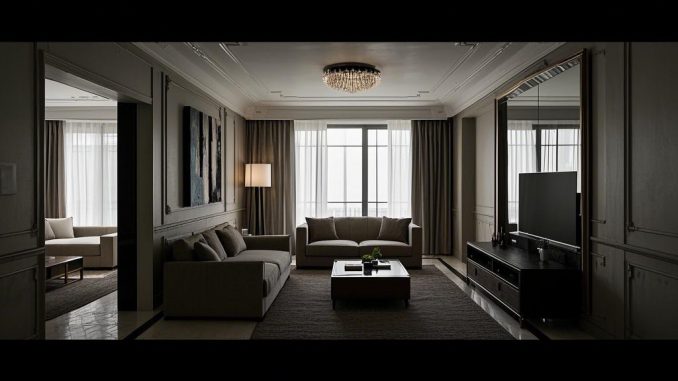
I. Introduction
Mirrors play a significant role in the traditional Chinese practice of Feng Shui, which focuses on the harmonious balance of energy, known as “Qi,” within living spaces. The strategic placement and use of mirrors can enhance positive Qi, redirect negative energy, and promote overall well-being. However, the misuse of mirrors can lead to disharmony and negative consequences. This essay explores the role of mirrors in Feng Shui, their benefits, and the precautions that should be taken to ensure their positive influence.

II. The Role of Mirrors in Feng Shui
1.Reflecting Positive Energy
Mirrors are believed to have the power to reflect positive Qi, thereby enhancing the energy within a space. For instance, placing a mirror opposite a window that receives plenty of sunlight can reflect the light and energy into the darker areas of the room, creating a more balanced and lively atmosphere.
2.Redirecting Negative Energy
Conversely, mirrors can also be used to redirect negative energy, known as “Sha,” away from a space. For example, if a building is located near a busy road or a noisy neighborhood, a strategically placed mirror can reflect this noise and commotion away from the interior, creating a more tranquil environment inside.
- Enhancing Spatial Perception

Mirrors can also alter the perception of space, making a small room appear larger and more open. This can be particularly beneficial in Feng Shui, where the flow of Qi should be unimpeded. A larger, more open space is believed to facilitate the smooth flow of energy, leading to better health, wealth, and relationships.
III. Precautions When Using Mirrors in Feng Shui
1.Avoid Placing Mirrors Opposite Doors

One of the most common Feng Shui rules is to avoid placing mirrors directly opposite doors, especially the main entrance. This is because mirrors can reflect the incoming energy, essentially sending it back out again before it has a chance to circulate throughout the home. This can lead to a lack of energy and a sense of instability within the household.
2.Be Mindful of Placement in Bedrooms
In Feng Shui, bedrooms are considered private spaces where the energy should be calm and nurturing. Therefore, mirrors should be used sparingly and with caution in these areas. It is generally recommended to avoid placing mirrors directly opposite or opposite the bed, as this can lead to disturbed sleep and even insomnia.
3.Use Mirrors to Complement, Not Dominate
While mirrors can enhance the flow of Qi, they should never be allowed to dominate a space. Large, wall – to – wall mirrors can create a sense of overwhelming energy and may disrupt the balance of Qi. Instead, mirrors should be used to complement the existing layout, enhancing the natural flow of energy without overwhelming it.
4.Select the Right Type of Mirror
Not all mirrors are created equal in the context of Feng Shui. For example, convex mirrors, which bulge outward, can expand the field of vision but may also disperse the energy too much. Concave mirrors, on the other hand, can focus energy but may create hotspots if not placed carefully. Flat mirrors are generally considered the safest option, as they reflect energy without altering its intensity or direction.
5.Consider the Color of the Mirror Frame
The color of the mirror frame can also influence the flow of Qi. In Feng Shui, different colors are associated with different elements and energies. For example, wooden frames are associated with stability and wood energy, while metal frames are associated with strength and metal energy. The choice of frame color should be made based on the desired energy and the existing layout of the space.
6.Clean and Maintain Mirrors Regularly
Mirrors should be kept clean and free of dust and debris to ensure they function effectively in reflecting and directing energy. A dirty mirror can impede the flow of Qi and even attract negative energy.
IV. Practical Examples of Mirror Placement in Feng Shui

1.In a Living Room
In a living room, a mirror can be placed opposite a window to reflect natural light and energy into the room. However, care should be taken to ensure that the mirror does not reflect directly into the kitchen or bathroom, as this can lead to the absorption of negative energy from these areas.
2.In a Bedroom
In a bedroom, a small mirror can be placed in a closet or behind a piece of furniture to avoid direct reflection opposite the bed. Alternatively, a mirror can be placed on the ceiling above the bed to create a sense of height and space, but this should be done sparingly and with caution.
3.In a Workspace
In a workspace, a mirror can be used to reflect natural light and improve visibility. However, it should not be placed directly opposite the workspace to avoid distracting reflections and to maintain a focused and concentrated energy.
V. Conclusion
Mirrors play a valuable role in Feng Shui, offering both benefits and potential pitfalls. When used correctly, they can enhance the flow of Qi, improve the aesthetic appeal of a space, and even promote better health and well-being. However, it is crucial to follow the precautions outlined above to ensure that the mirrors are not causing harm or disrupting the balance of energy within the home or workspace.
By understanding the role of mirrors in Feng Shui and the precautions that should be taken, individuals can make informed decisions about their use and create a more harmonious and balanced living or working environment. Whether you are redecorating your home or setting up a new workspace, considering the Feng Shui implications of mirrors can be a valuable addition to your planning process.

Leave a Reply